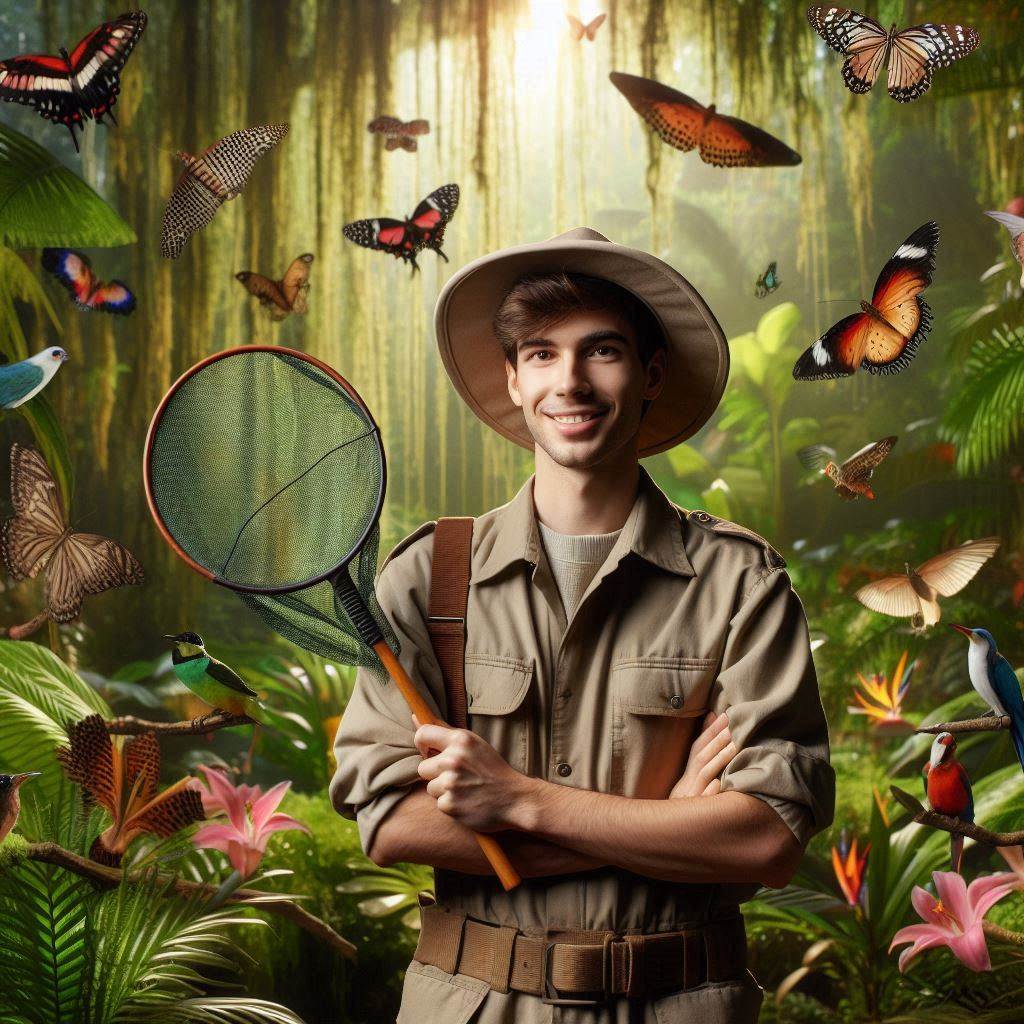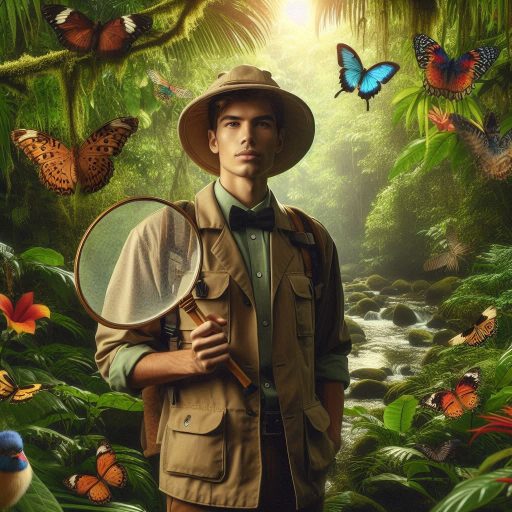Introduction
Transitioning from a zoology student to a professional can be an exciting yet daunting journey.
As a zoology student, you immerse yourself in the study of animals, ecosystems, and conservation.
This strong academic foundation prepares you for various career paths, but entering the job market can feel overwhelming.
One of the primary challenges faced during this transition is navigating the vast array of career options available.
Zoology graduates can pursue roles in research, wildlife conservation, education, and even healthcare.
Each path requires different skills and experiences, making it essential to clarify your interests and goals.
However, this transition also presents numerous opportunities.
The demand for professionals with a strong understanding of biology and ecology is growing.
Fields such as environmental science and wildlife management are increasingly relevant as society focuses on conservation and sustainability.
By leveraging your academic knowledge and gaining practical experience, you can embark on a fulfilling career that aligns with your passion for the natural world.
Assessing Transferable Skills
The Importance of Identifying and Leveraging Transferable Skills Acquired During Zoology Studies
Transitioning from a zoology student to a professional career requires assessing and leveraging transferable skills.
These skills often form the backbone of future job opportunities.
Identifying these abilities allows you to market yourself effectively in different fields.
A thorough understanding of your transferable skills is essential for successfully navigating your career transition.
Zoology studies provide a diverse skill set that extends beyond biological knowledge.
Many of these skills are applicable to various careers.
Recognizing and utilizing these skills can open doors to numerous professional pathways.
Examples of Transferable Skills Such as Research, Data Analysis, and Critical Thinking
Research skills rank among the most valuable assets gained during zoology studies.
Conducting research requires the ability to formulate hypotheses and design experiments.
You learn to collect data methodically and analyze it critically.
These research skills apply to numerous industries, including healthcare, education, and environmental science.
Data analysis is another crucial skill developed in zoology programs.
Zoology students often engage in quantitative and qualitative analyses.
You learn to interpret complex datasets and derive meaningful conclusions.
This analytical ability is highly sought after in roles such as data analysis, market research, and public policy.
Critical thinking is a cornerstone of zoological studies.
You constantly evaluate scientific literature, assess methodologies, and draw logical conclusions.
This skill enables you to approach problems systematically and make informed decisions.
Employers in various sectors value candidates who can think critically and solve problems creatively.
Communication skills also emerge as vital during your studies.
Presenting research findings requires clear and concise communication.
You learn to convey complex concepts to diverse audiences, whether through written reports or oral presentations.
Strong communication skills are essential in any professional setting, from teaching to marketing.
Read: Exploring the Different Branches of Geology
Exploring Career Options for Zoology Graduates
Graduating with a degree in zoology opens many career paths.
Understanding these options can help you make informed decisions.
Transform Your Career Today
Unlock a personalized career strategy that drives real results. Get tailored advice and a roadmap designed just for you.
Start NowGuidance on Exploring Various Career Paths for Zoology Graduates
Wildlife conservation stands out as a popular choice for zoology graduates.
Many organizations focus on protecting endangered species and preserving natural habitats.
You can work in national parks, wildlife reserves, or non-profit organizations.
Engaging in fieldwork allows you to study animal behavior and monitor ecosystems.
Environmental consulting also offers exciting opportunities.
In this role, you assess environmental impact and provide solutions for businesses.
Many companies hire environmental consultants to ensure compliance with regulations.
Your zoology background equips you with essential knowledge about ecosystems and biodiversity.
You can work on projects that promote sustainable practices and conservation efforts.
Research is another rewarding career option.
Many zoology graduates pursue advanced degrees to conduct research in various fields.
You could study animal physiology, genetics, or behavior.
Research positions exist in universities, government agencies, and private organizations.
You can contribute to scientific knowledge while helping to address pressing environmental issues.
Consider internships or volunteer opportunities to gain practical experience.
Internships provide valuable hands-on training and networking opportunities.
Many organizations seek volunteers for conservation projects, research studies, or educational programs.
These experiences enhance your resume and help you build connections in your chosen field.
Resources for Researching Different Industries and Potential Job Roles
Networking is crucial in exploring career options.
Attend industry conferences, workshops, or seminars to meet professionals.
Join zoological associations or online forums to connect with others in the field.
These interactions can lead to job opportunities and mentorship.
Utilize online resources for researching different industries.
Websites like the Bureau of Labor Statistics offer valuable information about job outlooks and salary expectations.
Online job boards can help you identify available positions in your area.
Additionally, career services at your university may provide job search assistance and career counseling.
Professional organizations also offer valuable resources.
The American Society of Mammalogists and the Wildlife Society provide job listings, networking events, and educational resources.
These organizations keep you informed about industry trends and advancements.
Consider your interests and strengths when exploring career options.
Reflect on what aspects of zoology excite you the most.
Whether it‘s working with wildlife, conducting research, or promoting conservation, find a path that aligns with your passion.
Finally, don’t hesitate to reach out to professionals in your desired field.
Conduct informational interviews to gain insights into their career paths.
These conversations can provide valuable guidance and help you make informed decisions.
Zoology graduates have various career options.
Explore wildlife conservation, environmental consulting, and research opportunities.
Utilize resources and networks to discover your ideal career path.
With determination and research, you can successfully transition into a fulfilling profession.
Read: Top Skills Needed for a Successful Geology Career
Networking and Building Connections
Transitioning from a student to a professional involves more than just education.
Networking plays a crucial role in this process.
Building connections can open doors to opportunities that may not be advertised.
It allows you to meet industry professionals who can offer guidance, mentorship, and job leads.
The Significance of Networking in Transitioning from a Student to a Professional
Networking helps you understand industry trends and expectations.
Engaging with professionals gives you insights into potential career paths and necessary skills.
Many job openings are filled through referrals, making connections essential.
Building a network can lead to internships, research opportunities, or job offers.
Moreover, it builds your confidence in navigating professional environments.
Tips on Building Professional Relationships
Start by attending industry-specific events, such as conferences, workshops, and seminars.
These gatherings allow you to meet professionals in your field.
Prepare an elevator pitch to introduce yourself effectively.
Share your interests, skills, and career goals in a concise manner.
Follow up with the people you meet.
Send a brief email expressing gratitude for their time and insights.
Mention specific points from your conversation to make your follow-up memorable.
This step helps solidify your connection and shows genuine interest.
Utilize social media platforms like LinkedIn to expand your network.
Create a professional profile that highlights your education, skills, and experiences.
Engage with content related to your field by commenting, sharing, and liking posts.
This interaction can help you connect with industry leaders and potential employers.
Join online communities related to zoology and conservation.
Participate in discussions, share your insights, and ask questions.
These platforms can lead to valuable connections and learning opportunities.
Engage actively to make a lasting impression on fellow members.
Attending Networking Events
Participating in networking events allows you to meet professionals face-to-face.
Research upcoming events in your area or online and register in advance.
Approach each event with an open mind and a willingness to engage with others.
At these events, focus on building authentic relationships rather than merely collecting business cards.
Show genuine interest in others‘ experiences and share your own.
This approach fosters meaningful connections that can lead to future opportunities.
Utilizing Social Media Platforms for Networking
Leverage social media to connect with professionals outside of formal events.
LinkedIn is particularly useful for establishing and maintaining professional relationships.
Join groups related to your field to engage with like-minded individuals.
Share relevant articles, insights, or experiences on your profile.
This activity showcases your expertise and keeps you visible in your network.
Connect with alumni from your university who work in your desired field.
They may offer guidance and support as you navigate your career transition.
Networking is vital for transitioning from a student to a professional.
Building relationships opens doors to various opportunities.
Attend events, engage on social media, and follow up with contacts.
With dedication and proactive efforts, you can create a strong professional network that supports your career goals.
Read: The Future of Botany: Emerging Fields and Innovations

Gaining Practical Experience
Gaining practical experience is crucial for transitioning from a student to a professional.
Engaging in internships, volunteer work, or part-time jobs allows you to apply theoretical knowledge in real-world settings.
This experience not only enhances your skills but also significantly shapes your career goals.
Advocate for Gaining Practical Experience Through Internships, Volunteer Work, or Part-Time Jobs
Internships provide an excellent opportunity to learn from professionals in your field.
Many organizations offer structured programs that allow you to gain valuable insights and hands-on experience.
These roles often expose you to different aspects of the industry, helping you understand your preferences better.
Volunteering is another fantastic way to gain experience while contributing to meaningful causes.
Many non-profit organizations and conservation groups seek volunteers for various projects.
This involvement can enhance your resume and demonstrate your commitment to the field.
It also allows you to develop skills that are highly valued by employers, such as teamwork, communication, and problem-solving.
Part-time jobs in related fields also offer valuable experience.
Working in a zoo, wildlife rehabilitation center, or research lab allows you to interact with professionals and gain practical skills.
These roles can be flexible and often accommodate your academic schedule while providing real-world experience.
The Value of Hands-On Experience in Shaping Career Goals and Increasing Marketability
Hands-on experience is invaluable in shaping your career goals.
It allows you to explore different roles and responsibilities within your field.
Through practical experiences, you can identify your strengths and interests.
This self-awareness helps you make informed decisions about your future career path.
Moreover, practical experience significantly increases your marketability to potential employers.
Employers often seek candidates with relevant experience.
Having internships, volunteer roles, or part-time jobs on your resume demonstrates initiative and commitment.
It shows that you are proactive in seeking opportunities to learn and grow.
In addition to technical skills, practical experiences help you develop soft skills.
You will enhance your communication, teamwork, and problem-solving abilities through real-world interactions.
These skills are essential in any professional setting and make you a more attractive candidate.
Furthermore, gaining practical experience allows you to build a professional network.
Working alongside experienced professionals helps you make connections in the industry.
These contacts can provide valuable advice, mentorship, and potential job opportunities in the future.
Finally, hands-on experience can provide clarity about your career goals.
You may discover specific areas of interest that resonate with you more than others.
This knowledge can guide your educational choices, helping you focus on relevant coursework or specializations.
Gaining practical experience is essential for career development.
Internships, volunteer work, and part-time jobs provide valuable opportunities to learn and grow.
These experiences not only shape your career goals but also enhance your marketability to employers.
Embrace every opportunity to gain hands-on experience, and watch your professional journey flourish.
Read: What Does a Geologist Do? Career Overview and Insights
Skill Development and Continuous Learning
In today’s fast-paced job market, continuous skill development is essential for success.
As a zoology graduate, enhancing your skills and knowledge keeps you competitive and prepared for various career opportunities.
Embracing lifelong learning can significantly impact your professional journey.
The Importance of Continuous Skill Development Through Workshops, Online Courses, and Professional Certifications
Workshops and seminars provide excellent opportunities for skill development.
These events often focus on specific topics relevant to your field.
Participating in these sessions allows you to learn from industry experts and gain practical insights.
Engaging in discussions and hands-on activities enhances your understanding and retention of new information.
Online courses are another valuable resource for skill enhancement.
Numerous platforms offer courses tailored to zoology graduates, covering topics such as wildlife management, conservation biology, and environmental policy.
These courses provide flexibility, allowing you to learn at your own pace while balancing other commitments.
Professional certifications can also boost your credibility and marketability.
Many organizations offer certification programs that validate your skills and knowledge in specialized areas.
These credentials demonstrate your commitment to professional development and can set you apart from other candidates in the job market.
Encourage Zoology Students to Stay Updated on Industry Trends and Advancements
Staying updated on industry trends is crucial for maintaining relevance in your field.
The zoology and conservation sectors continually evolve due to advances in technology and research.
Follow reputable journals, blogs, and news sources to keep informed about the latest developments.
Networking with professionals in your field can also help you stay current.
Attend conferences, workshops, and webinars to learn about new research and practices.
Engaging with peers and mentors can provide valuable insights into emerging trends and technologies.
Joining professional organizations and associations can further enhance your knowledge.
Many of these groups offer access to resources, newsletters, and training opportunities.
Membership can also connect you with other professionals who share your interests and goals.
Additionally, participating in online forums and discussion groups can foster continuous learning.
These platforms allow you to share ideas, ask questions, and engage in conversations about recent advancements.
Learning from others’ experiences can broaden your understanding of the industry.
Lastly, consider setting personal development goals.
Identify specific skills or knowledge areas you want to enhance, and create a plan to achieve these goals.
Regularly evaluate your progress and adjust your plan as needed.
This proactive approach will keep you motivated and engaged in your learning journey.
Continuous skill development is vital for zoology graduates.
Workshops, online courses, and professional certifications provide opportunities to enhance your knowledge and marketability.
Staying updated on industry trends and advancements will ensure you remain competitive in the job market.
Embrace lifelong learning, and invest in your professional growth for a successful career.
Learn More: A Day in the Life of a Meteorologist: What to Expect
Seeking Mentorship and Guidance
Mentorship plays a vital role in career development, especially during transitions.
For zoology graduates, seeking mentorship from experienced professionals can provide invaluable insights and guidance.
A mentor can help navigate the complexities of the job market and offer advice tailored to your goals.
The Benefits of Seeking Mentorship from Professionals in the Field
Having a mentor offers numerous benefits.
Firstly, mentors provide insights based on their experiences.
They can share knowledge about industry trends, career paths, and essential skills.
This information helps you make informed decisions and avoid common pitfalls.
Secondly, mentors can expand your professional network.
They often have established connections in the industry and can introduce you to valuable contacts.
These connections can lead to job opportunities, collaborations, and additional mentorship.
Moreover, mentors can offer personalized advice tailored to your unique situation.
They can help you identify your strengths and weaknesses and provide constructive feedback.
This guidance can enhance your professional development and increase your confidence.
Finally, a mentor can serve as a source of motivation and encouragement.
Their support can help you stay focused on your career goals during challenging times.
Having someone who believes in your potential can significantly boost your self-esteem and resilience.
Tips on Finding a Suitable Mentor and Establishing a Mutually Beneficial Mentor-Mentee Relationship
Finding a suitable mentor requires some effort and intentionality.
Start by identifying professionals whose careers align with your interests.
Look for individuals who work in fields you aspire to enter, such as wildlife conservation or environmental consulting.
Utilize your university‘s alumni network or career services to find potential mentors.
Many institutions offer mentoring programs that connect students with alumni in relevant fields.
You can also attend industry conferences and networking events to meet professionals who share your interests.
Once you identify a potential mentor, reach out to them with a respectful and concise message.
Introduce yourself, explain your interests, and express why you admire their work.
Ask if they would be open to having a conversation about their career journey and share their insights.
Establishing a mutually beneficial mentor-mentee relationship is crucial.
Approach the relationship with clear expectations and goals.
Be open about what you hope to gain from the mentorship while also considering how you can contribute.
Mentorship is a two-way street, and being respectful of your mentor‘s time is essential.
Maintain regular communication to keep the relationship active.
Schedule periodic check-ins to discuss your progress and seek advice.
Show gratitude for their guidance and share your achievements to keep them informed about your growth.
Finally, be open to feedback and willing to adapt based on your mentor’s suggestions.
Embrace their insights, even if they challenge your current thinking.
This openness will foster a productive and supportive relationship.
Seeking mentorship is a powerful strategy for career development.
The benefits of guidance, networking, and personalized advice can significantly impact your journey.
By finding a suitable mentor and establishing a mutually beneficial relationship, you can enhance your career transition and professional growth.
Transform Your Career Today
Unlock a personalized career strategy that drives real results. Get tailored advice and a roadmap designed just for you.
Start NowLearn More: Collaborating with Other Scientists: Interdisciplinary Research
Overcoming Challenges and Staying Resilient
Common Challenges Faced by Zoology Students During Career Transitions
Transitioning from a zoology student to a professional can be challenging.
Many students face obstacles that can dampen their spirits.
Job market saturation poses a significant challenge for recent graduates.
With many qualified candidates vying for limited positions, standing out becomes crucial.
Students may also experience job insecurity due to economic fluctuations.
Uncertainty in the job market can lead to anxiety and stress.
Strategies for Overcoming Obstacles, Staying Motivated, and Remaining Resilient Throughout the Transition Process
To navigate these challenges, students must develop a resilient mindset.
Resilience is the ability to bounce back from setbacks.
It allows individuals to adapt and thrive despite difficulties.
Embracing a positive attitude is essential during this transition.
Cultivating optimism can help students maintain motivation when faced with rejection.
Networking plays a vital role in overcoming job market saturation.
Connecting with professionals in the field opens up opportunities.
Attending industry conferences and seminars can expand your network.
These events provide avenues for meeting potential employers and mentors.
Joining professional organizations can also be beneficial.
Such groups often offer resources, job listings, and support.
Internships offer practical experience that enhances employability.
Engaging in internships while studying can provide invaluable insights.
They allow students to apply theoretical knowledge in real-world settings.
Internships can also lead to full-time job offers.
Even if they don‘t, they enhance resumes and skill sets.
Continuing education can help students stand out in a crowded job market.
Pursuing additional certifications or training in specialized areas can make candidates more appealing.
Transform Your Career Today
Unlock a personalized career strategy that drives real results. Get tailored advice and a roadmap designed just for you.
Start NowThese qualifications demonstrate a commitment to professional growth.
They also showcase a willingness to adapt to industry changes.
Conclusion
Transitioning from a zoology student to a professional offers exciting opportunities and unique challenges.
This journey requires a thoughtful approach and proactive steps.
First, clearly identify your career goals and create a structured plan to achieve them.
Understanding your aspirations will guide your decisions as you move forward.
Networking plays a vital role in discovering potential career paths.
Connect with alumni, professionals, and professors in your field.
Attend industry conferences and workshops to expand your network and gain insights.
Seek internships or volunteer opportunities to gain practical experience and enhance your resume.
Real-world exposure helps you apply your academic knowledge and makes you more attractive to employers.
Consider pursuing additional certifications or specialized education to bolster your qualifications.
Look into courses that align with your interests and career aspirations.
Staying adaptable and open to new experiences is crucial in a rapidly changing job market.
Embrace challenges as learning opportunities, and don‘t hesitate to ask for guidance from mentors or peers.
Remember, career transitions require patience and perseverance.
Trust in the skills and knowledge you’ve acquired during your studies.
You have a strong foundation in zoology that can lead to diverse and fulfilling career paths.
Take proactive steps today to shape your future.
Embrace the unique opportunities that await you in your professional life.
Your background in zoology provides a valuable perspective, whether you pursue research, conservation, education, or any related field.
Start making connections and exploring possibilities now to create a successful and rewarding career.




